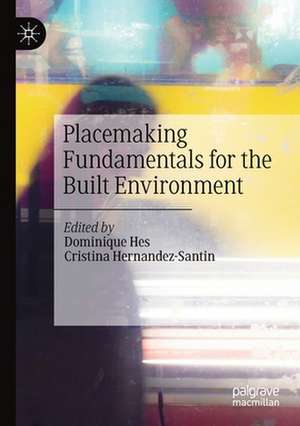Placemaking Fundamentals for the Built Environment
Editat de Dominique Hes, Cristina Hernandez-Santinen Limba Engleză Paperback – 13 noi 2020
This book is for all those actively working in the built environment. It presents the latest theory and practice of engaging with stakeholders to co-design, develop and manage thriving places. It starts from the importance of integrating design of nature into practice built on a foundation of First Nations understanding of place. The art of engagement of community, government and the development industry is discussed with reference to case studies and best practice techniques. The book then focuses on the critical role placemaking has in supporting resilience and adaptability of communities and looks at issues of leadership and governance. Building on these steps for placemaking, the last parts of the book address economics, evaluation, digital and art based tools and approaches to support projects that aim to create an engaged, contributive, collaborative and active citizen.
| Toate formatele și edițiile | Preț | Express |
|---|---|---|
| Paperback (1) | 783.15 lei 6-8 săpt. | |
| Springer Nature Singapore – 13 noi 2020 | 783.15 lei 6-8 săpt. | |
| Hardback (1) | 787.36 lei 6-8 săpt. | |
| Springer Nature Singapore – 13 noi 2019 | 787.36 lei 6-8 săpt. |
Preț: 783.15 lei
Preț vechi: 955.06 lei
-18% Nou
Puncte Express: 1175
Preț estimativ în valută:
149.86€ • 160.25$ • 124.95£
149.86€ • 160.25$ • 124.95£
Carte tipărită la comandă
Livrare economică 17 aprilie-01 mai
Preluare comenzi: 021 569.72.76
Specificații
ISBN-13: 9789813296268
ISBN-10: 9813296267
Pagini: 326
Ilustrații: XXIX, 326 p. 22 illus.
Dimensiuni: 148 x 210 mm
Greutate: 0.48 kg
Ediția:1st ed. 2020
Editura: Springer Nature Singapore
Colecția Palgrave Macmillan
Locul publicării:Singapore, Singapore
ISBN-10: 9813296267
Pagini: 326
Ilustrații: XXIX, 326 p. 22 illus.
Dimensiuni: 148 x 210 mm
Greutate: 0.48 kg
Ediția:1st ed. 2020
Editura: Springer Nature Singapore
Colecția Palgrave Macmillan
Locul publicării:Singapore, Singapore
Cuprins
1. Fundamentals of placemaking for the Built Environment: An Introduction.- 2. People in Place: Placemaking Fundamentals.- 3. Nature in place: Placemaking in the biosphere.- 4. There’s No Place Like (Without) Country.- 5. Community Engagement: What is it?.- 6. Local governments and developers in placemaking: Defining their responsibilities and capacities to shape place.- 7. Design for Change: An adaptive approach to urban places in transformation.- 8. Economics of Place.- 9. Project Implementation.- 10. Leadership in Placemaking.- 11. The Systems of Place Agency: Adaptive Governance for Public Benefit.- 12. DigitalXPlace.- 13. Place evaluation: Measuring what matters by prioritising relationships.- 14. The ART of engagement: Placemaking for nature and people in cities.
Notă biografică
Dominique Hes is Director of the Thrive Research Hub at the University of Melbourne, Australia.
Cristina Hernandez is a researcher based at the Thrive Research Hub, University of Melbourne, Australia. Combined with her qualifications within the field of ecology, she has extensive experience working across disciplines and utilising her expertise in Landscape Design and Participatory Design practice.
Textul de pe ultima copertă
This book is for all those actively working in the built environment. It presents the latest theory and practice of engaging with stakeholders to co-design, develop and manage thriving places. It starts from the importance of integrating design of nature into practice built on a foundation of First Nations understanding of place. The art of engagement of community, government and the development industry is discussed with reference to case studies and best practice techniques. The book then focuses on the critical role placemaking has in supporting resilience and adaptability of communities and looks at issues of leadership and governance. Building on these steps for placemaking, the last parts of the book address economics, evaluation, digital and art based tools and approaches to support projects that aim to create an engaged, contributive, collaborative and active citizen.
Caracteristici
Based on case-studies, this book provides a series of chapters on the critical steps of placemaking, including governance and community engagement strategies, negotiation processes, place evaluation, integrating nature into place and the economics of place Different models for placemaking are analysed and explored, such as tactical urbanism, guerrilla urbanism, creative placemaking and regenerative placemaking Written by the Place Agency Consortium, a group of five universities working towards enhancing place co-creation capacity in students and industry
